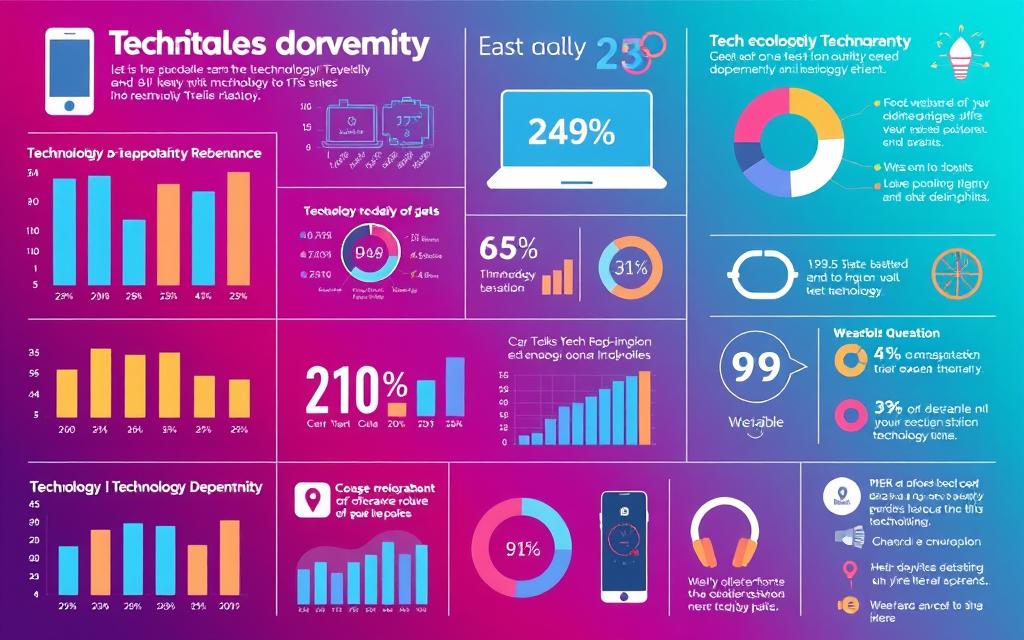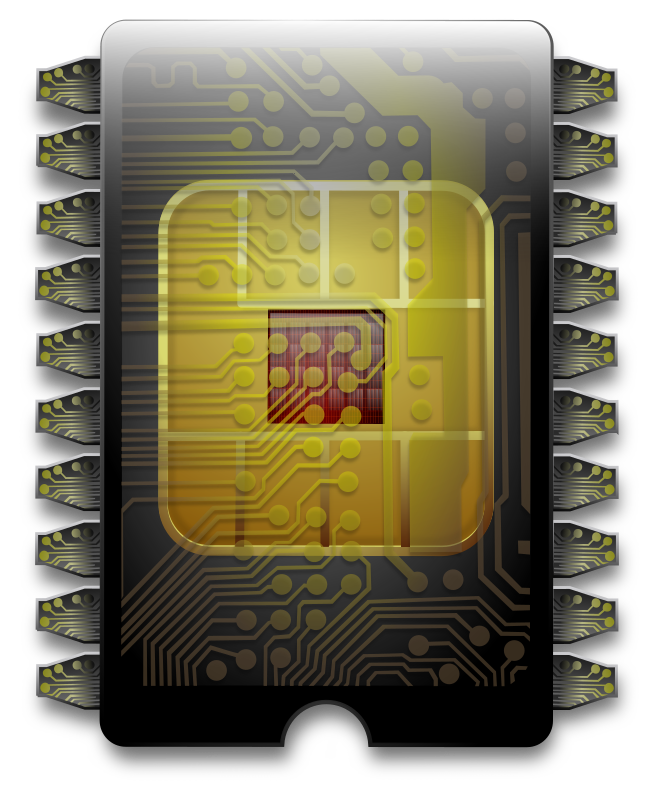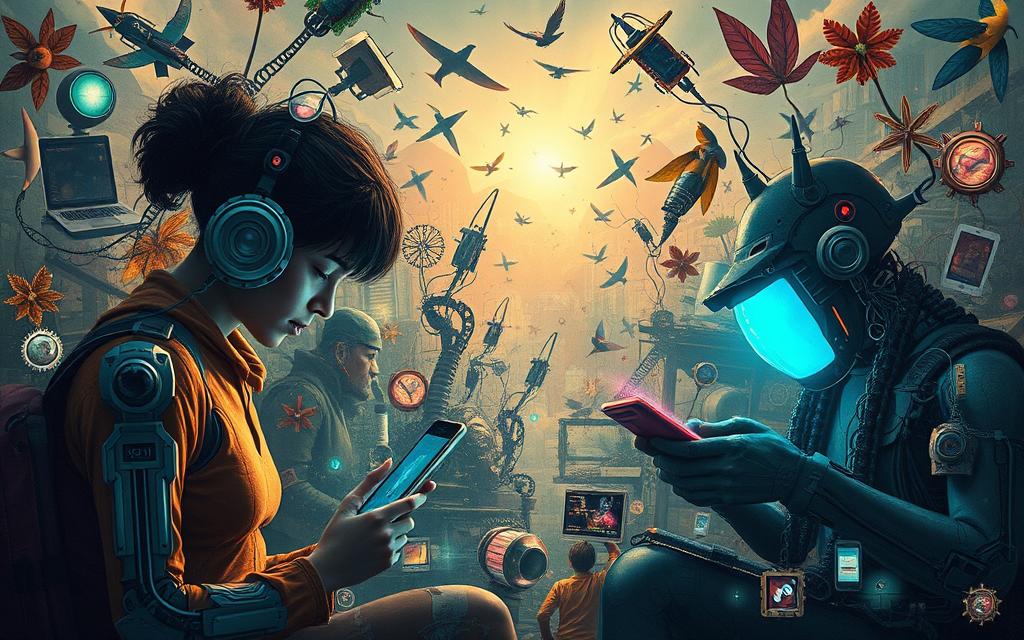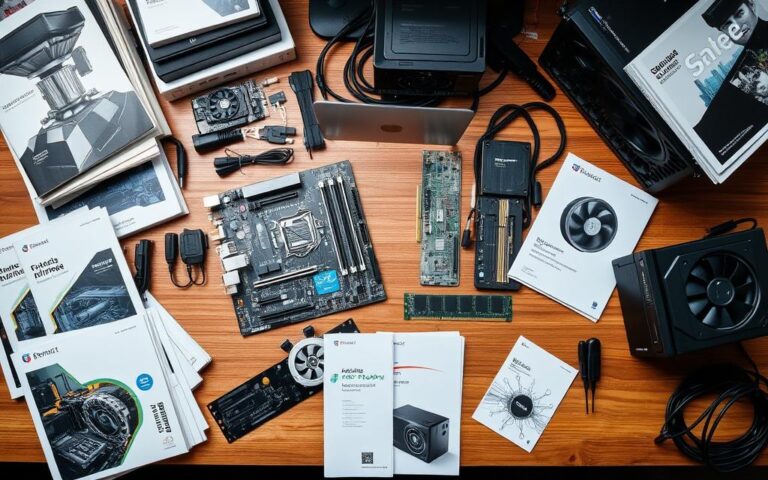How Dependent Are We on Technology Today?
Today, we are more tied to technology than ever before. It affects nearly every part of our daily lives. Technology has changed how we talk to each other, have fun, and interact. But, this change has good and bad sides. While gadgets like smartphones and platforms like social media offer big benefits, they also challenge our mental health. Some experts believe we may be getting addicted to digital devices. This could affect how society functions.
Looking into technology’s impact, it’s clear that too much screen time can harm us. Studies link heavy tech usage with anxiety, sadness, and feeling alone. Interestingly, over 70% of women and 61% of men feel anxious without their devices. This shows how tech affects our emotions and health. For more details, visit the UoPeople Blog.
The Pervasiveness of Technology in Daily Life
Technology is everywhere in our lives, thanks to smartphones. These devices change how we talk, learn, and have fun. They make tasks easier, keep us close to those we care about, and offer endless entertainment. This shows how technology shapes our daily habits.
The Role of Smartphones
Smartphones do more than help us chat. They’re key in keeping us linked to people we care for. They also help us organise our lives, like planning and setting reminders. If we lose our phones, we often feel lost. This shows their big role in our modern life.
Technology in Communication
Communication tech has made talking easy, no matter the distance. Through social media and messaging apps, sharing news is instant. However, this can mean we see friends less face-to-face. Technology makes chatting easy but can lessen meaningful talks. We may focus on quick messages rather than deep conversations.
Impact on Entertainment
Entertainment has changed with tech too. More people stream shows instead of social activities. Binge-watching is now common, changing how we see and interact with media. Entertainment has become more about watching alone. This can reduce time spent with others and shared experiences.
How Much Do We Rely on Technology
Our bond with technology has grown complex, influenced by many factors. A large part of the population recognizes their digital device addiction. This is notably true for 50 percent of teens who admit they’re hooked on their smartphones, showing the widespread dependency.
Statistics on Technology Dependency
In today’s digital-dominated world, 79 percent of teens look at their phones every hour. Of them, 72 percent quickly respond to texts, showing a heavy use of devices. A troubling 35 percent even text while driving, highlighting the dangers of such addiction. People use many apps, from CNN for news to Facebook Messenger and Snapchat for chatting, fueling the dependency.
The Concept of Nomophobia
Many people have nomophobia, or fear of being without their phone. About 66 percent feel anxious without their phones nearby, pointing to mental health issues from too much tech use. Getting notifications can distract and cause delays, hurting work performance. This shift towards preferring screens affects our real-life connections, leading to less meaningful conversations.
Technology Usage Across Demographics
Different groups use technology in varied ways, influenced by age, gender, and income. It’s worrisome that adults often choose tech over time with their kids, which can harm family bonds. This change towards tech-centered living is clear. The data from surveys urge us to find a balance between digital use and real interaction.

The Positive and Negative Impacts on Mental Health
Technology is key in shaping our mental health. It brings both good and tough aspects, mainly in how we connect with others. Looking at both sides helps us understand our deep reliance on digital tools today.
Benefits of Technology for Social Connections
Technology helps people build and keep connections beyond physical distances. Benefits of social media include reconnecting with loved ones, finding support groups, and reaching mental health help. For example, teletherapy has made getting mental health care easier, even in remote places.
This growth in connections can reduce loneliness and boost community bonds.
Negative Effects: Anxiety and Depression
But, technology use also has major downsides. Studies show it can lead to issues like anxiety, depression, and poor sleep. Too much social media can increase feelings of sadness and worry. This is often because people feel bad comparing themselves to the perfect images they see online.
Thus, being mindful of how we use technology is key to avoid these issues.
Impact on Attention Span and Memory
Technology’s impact on our minds also needs focus. Spending a lot of time on digital devices can hurt our attention and memory. Limiting screen time, especially before bed, helps improve sleep, clarity of mind, and reduces stress.
Taking breaks from screens and valuing in-person talks can lessen loneliness and keep community connections strong.
| Impact | Positive Aspects | Negative Aspects |
|---|---|---|
| Social Connections | Strengthened ties through social media; access to supportive communities | Increased feelings of isolation from excessive digital engagement |
| Cognitive Effects | Improved access to mental health services | Diminished attention spans; reliance on technology for memory retention |
| Mental Health | Facilitation of teletherapy; mindfulness practices | Heightened anxiety, depression linked to social media use |
Technological Dependence and Its Societal Implications
The swift move to digital communication marks deep changes in society. It has altered how we connect and the essence of our relationships. As we adapt to new ways of chatting, we must think about how this affects face-to-face talks and social standards.
Changes in Communication Methods
Today’s communication leans heavily on tech, especially social media. The internet lets us talk instantly, breaking the distance barrier. Because of this, chatting in person is giving way to texts and online chats.
- The average person uses social media for more than two hours a day.
- By 2022, apps like Zoom became really popular for video calls.
- Finding dates or making new friends online is now very common.
Effects on Face-to-Face Interactions
Less face-to-face chat has sparked worries about our emotional smarts and relationship quality. With fewer in-person meets, it’s easier to misunderstand each other. This can lead to feeling lonely or left out. As tech takes over, we lose chances for real empathy. We may choose simple texts over meaningful talks.
Studies show that many of us rely too much on gadgets, harming both love life and friendships. Hiding in digital worlds often means shallow bonds, missing out on real connection.
Finding a good middle-ground with tech use is crucial. Being mindful of how communication changes can help avoid the bad side effects. This ensures we keep the key skill of talking well with others.
Conclusion
In our journey through technology dependence, we’ve uncovered its huge effect on our daily routines. About 3.8 billion people worldwide used smartphones by 2021. This fact underlines the vast influence tech has on how we connect, both in personal and professional settings.
Thinking about the future of relying on technology, we see it playing two roles. It boosts business efficiency and our life quality. Yet, it also brings up issues like privacy concerns, mental well-being, and weaker in-person bonds.
To keep tech in our lives but reduce its negative effects, we need to act carefully. It’s not just up to us but society to find a balance. By raising awareness and promoting healthy tech use, we can enjoy its advantages and avoid the drawbacks.
As technology grows, taking a thoughtful approach will help us achieve a better life with digital tools. This way, we aim for a peaceful living alongside technology.
FAQ
What is technology dependence?
Technology dependence means relying heavily on tech devices and systems. It’s for things like chatting, everyday tasks, and having fun. This reliance brings both good points and challenges to society today.
How do smartphones affect daily technology use?
Smartphones are key to daily tech use. They help with contacting others, staying organized, and finding entertainment. Not having them can be stressful.
What statistics show how much we rely on technology?
Studies show about 77% of people think we depend too much on technology. There are big worries about addiction to it.
What is nomophobia and who does it affect?
Nomophobia is the fear of not having a mobile phone. It affects 66% of people. It can make anxiety worse and cause mental health problems.
How does technology impact mental health positively?
Technology helps mental health by keeping people connected. Online communities offer support and understanding. This reduces feelings of being alone.
What are the negative mental health effects of excessive technology use?
Using tech too much can make anxiety, depression, and loneliness worse. Comparing lives on social media can also make people feel down.
How has technology changed communication methods?
Communication has moved from in-person chats to mostly online talks. This change affects how we interact and may reduce how empathetic we are.
What are the societal implications of technological dependence?
Relying too much on technology means less face-to-face talking. This can cause misunderstandings and loneliness. We need to find the right mix of digital and real-life conversations.















